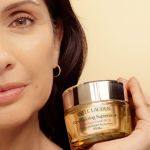
Is it possible for the beauty industry to talk about mental health?
After years of non-inclusive marketing, first signals of awareness are emerging in the sector
October 10th, 2022
The beauty industry is the daughter of our time. From the glossy covers of the eighties to the post-retail images on Instagram, the beauty ideals promoted by fashion and beauty brands run at the speed of light towards increasingly plastic standards often very far from the reality of human imperfection. Filters that shape features, colors and shapes of reality, together with continuous stimuli related to unrealistic physical and aesthetic objectives create communities responsive to recognize and point out anyone's imperfections, even on celebrities like Kendall Jenner and Selena Gomez. In an environment where we are all subjected to continuous confrontation with a perception of distorted normality, mental health can become difficult to safeguard, and beauty is responsible for it. But something is changing, and here is that the first inclusive campaigns and attentive to values such as kindness and self-care replace aesthetic diktat, as forUnconventional Beauty by Gucci Beauty and Mental Health 101 by Rare Beauty that recognize mental health and inclusiveness as elements of beauty.
On the occasion of World Mental Health Day on October 10th, nss G-Club wants to identify the brands that have shown real interest in the causes related to the mental health of their customers, facilitated effective conversations and addressed public interest on the subject.
Needs and desires
Beauty is a factor with a high impact on individual psycho-physical well-being. The $532 billion-dollar beauty business has for years based sales strategies on the concept of creating ad-hoc problems and solutions for "problems" or features perceived as such, instilling needs in customers and pushing products that cover and undo imperfections rather than emphasizing and glorifying the beauty of the wearer. Acne, cellulite, wrinkles, skin spots and dyschromia are defects to be corrected, monsters to be rid of, anguish to fight and eliminate, rather than accept and make more homogeneous. Beauty, or its continuous research, can become a real obsession for those who aren't running at the industry's pace. According to a study by Translational Behavioral Medicine, in 2020 anxiety levels were 6 times higher than in 2019, due to the continuous comparison with unreal standards of post-produced realities passed only through digital.
Beauty campaigns focused on mental health
The effect of the pandemic brought more awareness on the theme of inclusion, beauty and skin-positivity, and as a reflection more and more brands are changing their core values in a more attentive to real human needs. Kindness, compassion, self-care and confidence emerge in the beauty and fashion campaigns of Fenty Beauty, philosophy, Youth To The People, Goovi and Superfluid. Another fundamental element that unlocks social limits in favour of a healthier environment is the normalization of psychological therapy: the American cosmetics brand Dr. Brandt has recently started a collaboration with the online therapy service Better Help to allow its customers to take advantage of services to feel good inside and out. The beauty world has opened its eyes to the evidence that mental health is the issue at the heart of the mental and physical well-being of those who choose to purchase a product. An increasingly conscious clientele desires an added value that brings about an almost magical change in their days or routines, even to the point of building an almost magical ritual to feel their best without having to chase someone else's aesthetic.
Rare Beauty is one of the brands born with mental health at the center of its interests and goals: launched by Selena Gomez lo in May 2020 along with the Mental Health 101 campaign in support of the Rare Impact Fund created to raise funds for research, the brand's customer-sensitivity-conscious communication has been very successful, so it has replicated in 2022. "Your Words Matter" is this year's campaign launched by Selena to raise consumer awareness about the words that are used when talking about mental health. The same devoted approach to words is used by Keys Soulcare, Alicia Keys' brand, which matches each product with a motivational phrase to combine the habit of skincare and bodycare with that of using kind and encouraging words for oneself and feeling good through a daily manifestation to emanate and attract positive energy.
A value to safeguard
Mental health is a social value to solidify and normalize in all areas of the market, avoiding performative participation,
"because today’s customers are more aware of what they buy and see, they are connected to the world around them. Being perceived as untruthful becomes a downside to the brand." - Sara Jindal, Mintel beauty analyst
Being transparent if you donate funds to a charity, talk to industry experts and choose the right faces to drive campaigns that connect to the intrinsic values of a product and especially to the community are some of the best strategies that a brand can take to be truly mindful of mental health in and out of work contexts without blindly stepping on the bandwagon of an apparent new trend.







































